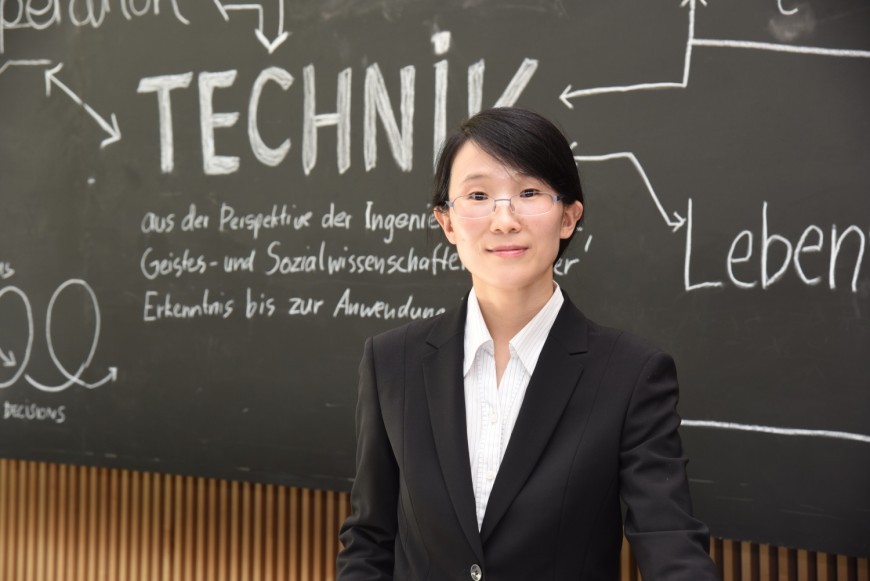LogiNet makes neural networks greener and more transparent
Professor Grace Li Zhang awarded ERC Starting Grant
2025/09/04 by Silke Paradowski
etit Professor Grace Li Zhang has been awarded a Starting Grant by the European Research Council (ERC) for her research project “LogiNet”. She will receive 1.5 million euros. LogiNet pursues a new approach to making neural networks – the heart of many artificial intelligence (AI) applications – more energy-efficient and transparent. LogiNet not only develops new solutions for green AI to benefit the economy and the environment but also lays the foundation for new directions such as logic-based DNN validation in the era of large-scale models that have started to influence our society fundamentally.

LogiNet – “Logic-Driven Efficient Computing and Analysis of Deep Neural Networks on Hardware” – deals with deep neural networks (DNNs). DNNs are the algorithms used to realise Artificial Intelligence. They are inspired by the structure of the human brain and consist of many layers, each of which processes data in a different way and then sends the processed data to subsequent layers. DNNs have achieved major advances in many fields and are the drivers for various applications such as image recognition and text processing. However, they require enormous computing power: the massive multiplications and additions that repeatedly exist inside DNNs, known as multiply-accumulate (MAC) operations, are complex and consume enormous energy on today's computer hardware, for instance, graphics processing units.
Focus on the logical structure and function of networks
Until now, research has focused on simply accelerating MAC operations rather than examining their actual logical functions after training. The blind execution of massive MAC operations not only consumes a lot of energy but also makes it difficult to understand the decision-making insides of DNNs. The internal decision-making processes of DNNs are almost impossible to examine and verify.
Professor Grace Li Zhang (Hardware for Artificial Intelligence Lab) is addressing these issues as part of LogiNet. She is investigating a new way of executing DNNs that focuses on the logical structure and highly abstract function of neural networks. Not only improving computing power, the project also examines the logic reasoning inside neural networks – in other words, what the networks actually do logically. The idea is to convert data that has already been learned (‘weights’) directly into simple logical circuits of MAC operations and wire them together, so to speak. This reduces complexity, computing power, data movement and energy consumption. At the same time, it also provides a better understanding of how the neural networks make decisions. LogiNet analyses the properties of DNNs, such as hardware reliability and fairness in decision-making.
The research aims to lay the foundation for DNNs to consume less energy and thus move closer to the goal of “green AI” on a wide variety of hardware platforms, from small sensors to large data centres. In addition, the project will ensure that neural networks can be better analysed in terms of transparency, fairness and reliability.
About
Grace Li Zhang has been Assistant Professor of Hardware for Artificial Intelligence at the Department of Electrical Engineering and Information Technology at TU Darmstadt since October 2022. Her work there focuses on researching efficient hardware-software architectures for machine learning, neural networks with new components, explainability of AI, and neuromorphic computing.
Zhang received her doctorate and habilitation from the Technical University of Munich. She has won numerous awards for her research work. She has an extensive international network and is a member of several professional associations. Since 2022, she has been a member of hessian.AI, the Hessian Centre for Artificial Intelligence.
ERC Starting Grants
ERC Starting Grants are awarded by the European Research Council (ERC) to researchers from all disciplines within seven years of completing their doctorate. With these grants, the European Union aims to support outstanding research and promote early-career scientists. The Starting Grant targets researchers at the beginning of their independent careers who have already demonstrated scientific excellence and seek to establish their own research projects or research groups.
Always up-to-date with exciting news from the etit campus: Follow us on Instagram!
Recommended external content
We have selected external content from Instagram for you and would like to show it to you right here. To do this, you must reveal it with one click. You can hide the external content at any time with another click.
I agree to external content from X being shown to me. This may result in personal data being transmitted to third-party platforms. You can find more information in our Privacy Policy.



